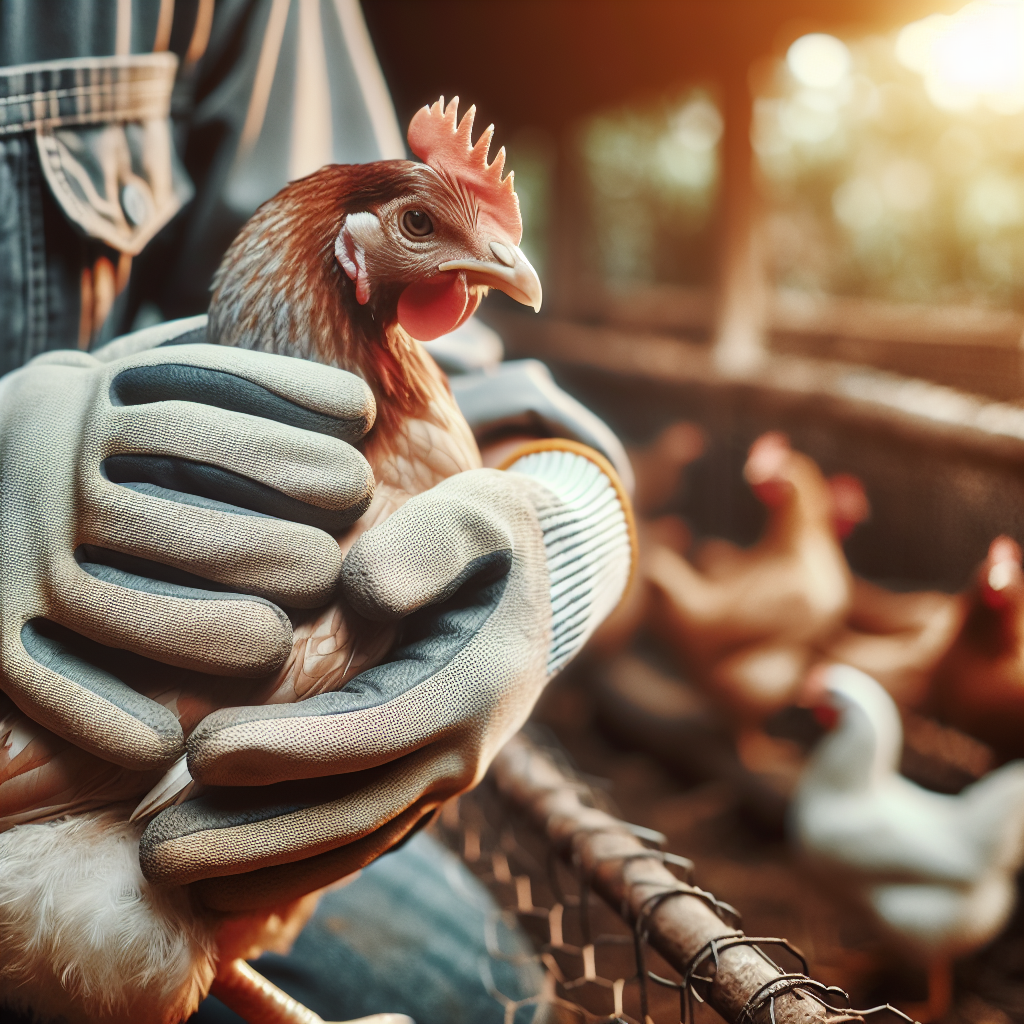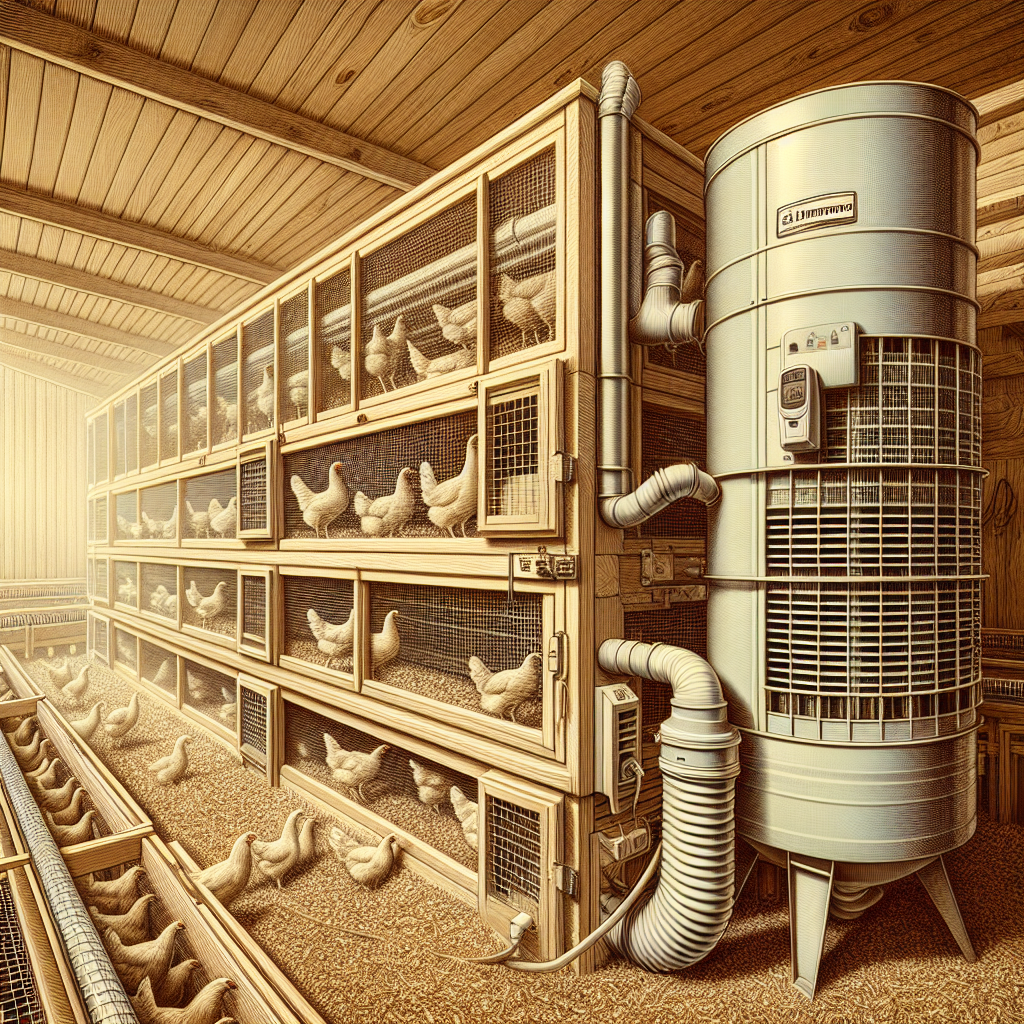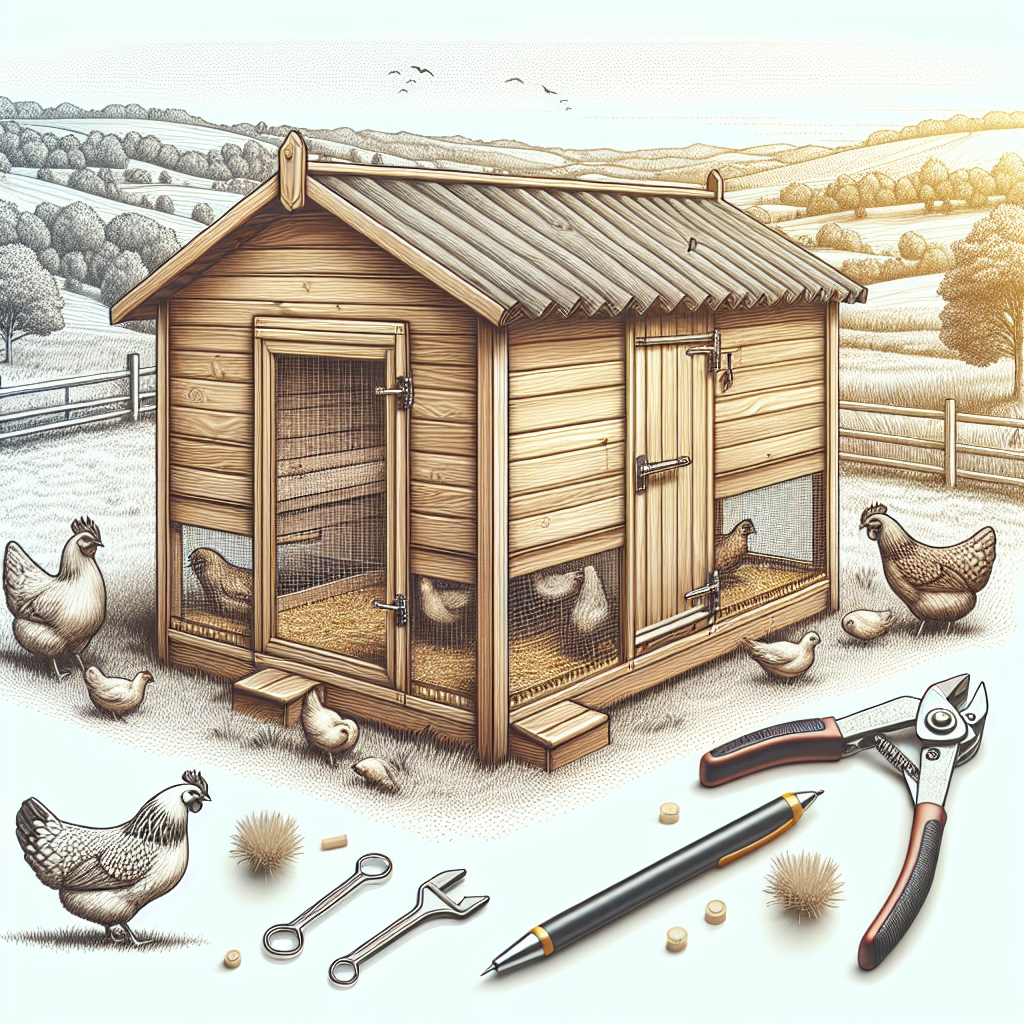If you’re looking to lighten the load of chicken coop maintenance, you’ve come to the right place. In this article, we’ll explore effective strategies for training and educating others to help you out. From sharing your expertise to providing hands-on demonstrations, you’ll discover practical tips and techniques to empower your helpers and ensure a smooth-running coop. Get ready to pass on your knowledge and create a team of competent chicken coop caretakers!
Assessing the Need for Assistance
Evaluate the current workload
Before you begin training others to assist with chicken coop maintenance, it’s important to evaluate the current workload and determine if there is a need for additional help. Take stock of all the tasks required to maintain the chicken coop, such as cleaning, feeding, and general upkeep. Assess the time and effort it takes to complete these tasks on a daily and weekly basis to gauge whether assistance is necessary.
Identify specific areas requiring assistance
Once you’ve evaluated the workload, it’s essential to identify the specific areas that require assistance. This could be tasks that require specialized skills or knowledge, or simply tasks that demand too much time for one person to handle effectively. For example, cleaning and sanitizing the coop regularly may be a time-consuming task that would benefit from additional help. Identifying the specific areas in need of assistance will help you tailor your training program to address these specific needs.
Setting Clear Expectations
Define roles and responsibilities
To ensure effective assistance with chicken coop maintenance, it’s crucial to define clear roles and responsibilities for everyone involved. Clearly outline the tasks each individual will be responsible for, making sure to match their skills and strengths to the appropriate tasks. By defining roles and responsibilities, you create a sense of clarity and accountability, ensuring that everyone understands and fulfills their obligations.
Establish maintenance goals and objectives
In addition to defining roles and responsibilities, it’s important to establish maintenance goals and objectives. This provides a clear direction for the training program and helps everyone understand what they are working towards. Set specific goals, such as maintaining a clean and sanitary coop or ensuring the health and well-being of the chickens. Clearly communicate these goals to your team and regularly assess progress to ensure everyone is on track.
Providing Basic Chicken Coop Maintenance Training
Introduction to chicken coop maintenance
Start the training program by providing a comprehensive introduction to chicken coop maintenance. Familiarize your team with the various components of a chicken coop, such as the nesting boxes, feeding and watering systems, and overall structure. Explain the importance of regular maintenance and the impact it has on the health and productivity of the chickens. This introduction will give your team a solid foundation of knowledge to build upon.
Safety precautions and guidelines
Next, make sure to emphasize the importance of safety precautions and guidelines when it comes to chicken coop maintenance. Teach your team about potential hazards, such as handling tools and chemicals, and how to protect themselves and the chickens from harm. Demonstrate proper lifting and carrying techniques to prevent injuries, and encourage the use of personal protective equipment like gloves and goggles. Safety should always be a top priority when maintaining a chicken coop.
Daily maintenance tasks
Provide detailed training on the various daily maintenance tasks that need to be performed in the chicken coop. This includes tasks such as feeding the chickens, checking water levels, and collecting eggs. Explain the proper procedures for each task, highlighting any specific techniques or considerations. Emphasize the importance of consistency and regularity in performing these tasks to ensure the well-being of the chickens.
Cleaning and sanitization practices
Teach your team the proper cleaning and sanitization practices for the chicken coop. This includes regularly removing waste and debris, cleaning the nesting boxes, and disinfecting surfaces. Demonstrate the correct use of cleaning products and tools, and explain the importance of maintaining a clean and hygienic environment for the chickens. By providing comprehensive training on cleaning and sanitization practices, you can ensure the overall health and comfort of the chickens.
Teaching Specific Skills and Techniques
Nest box maintenance
Train your team on the specific skills and techniques required for nest box maintenance. Demonstrate how to clean and sanitize the nest boxes regularly, ensuring that they provide a clean and comfortable environment for egg-laying hens. Show them how to properly replace bedding materials and address any issues or repairs that may be needed. By teaching your team how to maintain the nest boxes effectively, you can ensure the quality and cleanliness of the eggs.
Feeding and watering systems
Provide training on the proper operation and maintenance of the feeding and watering systems in the chicken coop. Explain the importance of providing a consistent and balanced diet for the chickens, and demonstrate how to properly refill feeders and waterers. Teach your team how to identify and address any issues with these systems, such as blockages or leaks. By ensuring proper feeding and watering practices, you contribute to the overall health and productivity of the chickens.
Egg collection and handling
Educate your team on the correct techniques for egg collection and handling. Show them how to gently remove eggs from the nest boxes to prevent breakage and contamination. Explain the importance of proper storage and handling to maintain the freshness and quality of the eggs. By teaching your team how to collect and handle eggs effectively, you can ensure that the eggs are safe for consumption or sale.
Identifying and treating common illnesses
Train your team to identify and treat common illnesses that can affect chickens. Teach them how to recognize symptoms of various illnesses, such as respiratory infections or parasites, and the appropriate steps to take for treatment. Explain the importance of regular health checks and monitoring for early detection of any health issues. By empowering your team with the knowledge to identify and treat illnesses, you can help maintain the overall health and well-being of the chickens.
Chicken handling and restraint
Ensure your team is trained in proper chicken handling and restraint techniques. Demonstrate how to safely handle and catch chickens, minimizing stress and risk of injury to both the chickens and the handlers. Teach them how to properly restrain a chicken for examinations or treatments. By providing training on chicken handling and restraint, you can create a safe and calm environment for both the chickens and your team.
Demonstrating Efficient Maintenance Techniques
Time-saving strategies
Demonstrate to your team various time-saving strategies to optimize their efficiency in chicken coop maintenance. Show them how to prioritize tasks and develop a routine that minimizes time wastage. Teach them the importance of proper time management and how to streamline processes for maximum productivity. By implementing time-saving strategies, you can ensure that maintenance tasks are completed efficiently, leaving more time for other important activities.
Proper use of tools and equipment
Ensure that your team understands the proper use of tools and equipment for chicken coop maintenance. Provide training on the correct handling and operation of tools such as rakes, shovels, and scrub brushes. Show them how to properly maintain and store these tools to prolong their lifespan. By teaching your team how to use tools and equipment effectively, you create a safe and efficient work environment.
Optimizing workflow and organization
Train your team on how to optimize workflow and organization in the chicken coop. Show them how to arrange supplies and tools for easy access and efficient workflow. Teach them how to implement systems for inventory management and record-keeping. By optimizing workflow and organization, you can minimize downtime and maximize productivity in the maintenance process.
Implementing Effective Communication Channels
Establish regular check-ins and group meetings
Create a system of regular check-ins and group meetings to ensure effective communication among your team. Schedule regular meetings to discuss any issues, provide updates, and address questions or concerns. This allows for open dialogue and ensures that everyone is on the same page regarding maintenance tasks and responsibilities.
Use of communication platforms (email, chat, etc.)
Leverage communication platforms such as email or chat to facilitate efficient communication between team members. Encourage the use of these platforms for quick updates, coordination, or sharing of important information. By utilizing communication platforms, you can ensure effective and timely communication, even when team members are not physically present.
Encourage open dialogue and feedback
Promote an environment of open dialogue and feedback among your team members. Encourage them to share any ideas, suggestions, or concerns they may have regarding chicken coop maintenance. Actively listen to their input and provide constructive feedback to foster a culture of continuous improvement. By encouraging open dialogue and feedback, you create a collaborative and supportive team dynamic.
Monitoring and Assessing Progress
Regular evaluation of tasks and responsibilities
Regularly evaluate the performance of tasks and responsibilities assigned to your team members. Monitor their progress and assess the quality of their work. Provide constructive feedback and address any areas that may require improvement. By consistently monitoring and evaluating progress, you can ensure that maintenance tasks are being completed effectively and to the desired standard.
Provide constructive feedback
When assessing the performance of your team members, provide constructive feedback to help them improve their skills and techniques. Acknowledge their strengths and areas of improvement, and offer guidance on how to enhance their performance. By offering constructive feedback, you not only help your team members grow, but also contribute to the overall success of the chicken coop maintenance.
Identify areas of improvement
In addition to providing feedback, identify areas of improvement within your training program or maintenance processes. Assess whether there are any gaps in knowledge or skills that need to be addressed. Look for opportunities to enhance efficiency or introduce new techniques. By continuously identifying areas of improvement, you can refine your training program and ensure that your team is equipped with the necessary skills and knowledge.
Recognize and celebrate achievements
Recognize and celebrate achievements of your team members to boost morale and motivation. Acknowledge their contributions and highlight their successes. This could be as simple as a verbal acknowledgment or a small reward for a job well done. By recognizing and celebrating achievements, you create a positive and supportive work environment.
Developing Troubleshooting Skills
Problem-solving techniques
Train your team in problem-solving techniques to effectively address any challenges or issues that may arise during chicken coop maintenance. Teach them how to identify the root cause of a problem, brainstorm potential solutions, and evaluate the best course of action. Encourage critical thinking and creativity in problem-solving to foster a proactive approach to maintenance challenges.
Training on common coop maintenance issues
Provide specific training on common coop maintenance issues that may occur. This could include issues such as pests, leaky roofs, or broken equipment. Show your team how to identify these issues and guide them through the necessary steps for resolution. By training them on common coop maintenance issues, you empower your team to handle a variety of challenges effectively.
Encouraging critical thinking
Encourage critical thinking within your team when it comes to coop maintenance. Foster an environment where they feel comfortable analyzing situations, asking questions, and proposing solutions. By encouraging critical thinking, you promote independent problem-solving and innovation within your team.
Promoting a Culture of Safety
Educate on safe handling of tools and chemicals
Continuously educate your team on the safe handling of tools and chemicals used in chicken coop maintenance. Reinforce the importance of following safety guidelines and demonstrate proper techniques for using equipment and chemicals. Emphasize the potential risks and the necessity of taking precautions to avoid accidents or injuries.
Implement proper lifting and carrying techniques
Teach your team proper lifting and carrying techniques to prevent injuries during maintenance tasks. Show them how to lift and carry heavy objects using their legs and not their back, minimizing the strain on their bodies. By implementing proper lifting and carrying techniques, you reduce the risk of musculoskeletal injuries among your team members.
Encourage the use of personal protective equipment
Promote the use of personal protective equipment (PPE) among your team members. Provide them with the necessary PPE, such as gloves, goggles, and masks, and reinforce the importance of using them during maintenance activities. By encouraging the use of PPE, you prioritize the safety and well-being of your team.
Continued Education and Development
Stay updated on industry best practices
As a trainer, it’s essential to stay updated on industry best practices for chicken coop maintenance. Attend workshops, seminars, or conferences to stay informed about the latest trends and techniques. Share this knowledge with your team to ensure they are always utilizing the most effective and efficient methods.
Share resources and educational materials
Continuously share resources and educational materials with your team to foster their ongoing development. This could include articles, books, videos, or online courses related to chicken coop maintenance. Encourage your team to explore these materials and provide opportunities for discussion or further learning.
Encourage participation in relevant workshops or seminars
Promote participation in relevant workshops or seminars related to chicken coop maintenance. These external training opportunities can broaden your team’s knowledge and provide valuable insights from industry experts. Support and facilitate their attendance to further enhance their skills and expertise.
By following these comprehensive training strategies and techniques, you can effectively educate others to assist with chicken coop maintenance. Remember to assess the need for assistance, set clear expectations, provide thorough training, demonstrate efficient maintenance techniques, implement effective communication channels, monitor and assess progress, develop troubleshooting skills, promote a culture of safety, and prioritize continued education and development. With a well-trained and knowledgeable team, your chicken coop maintenance endeavors will be efficient and successful.




